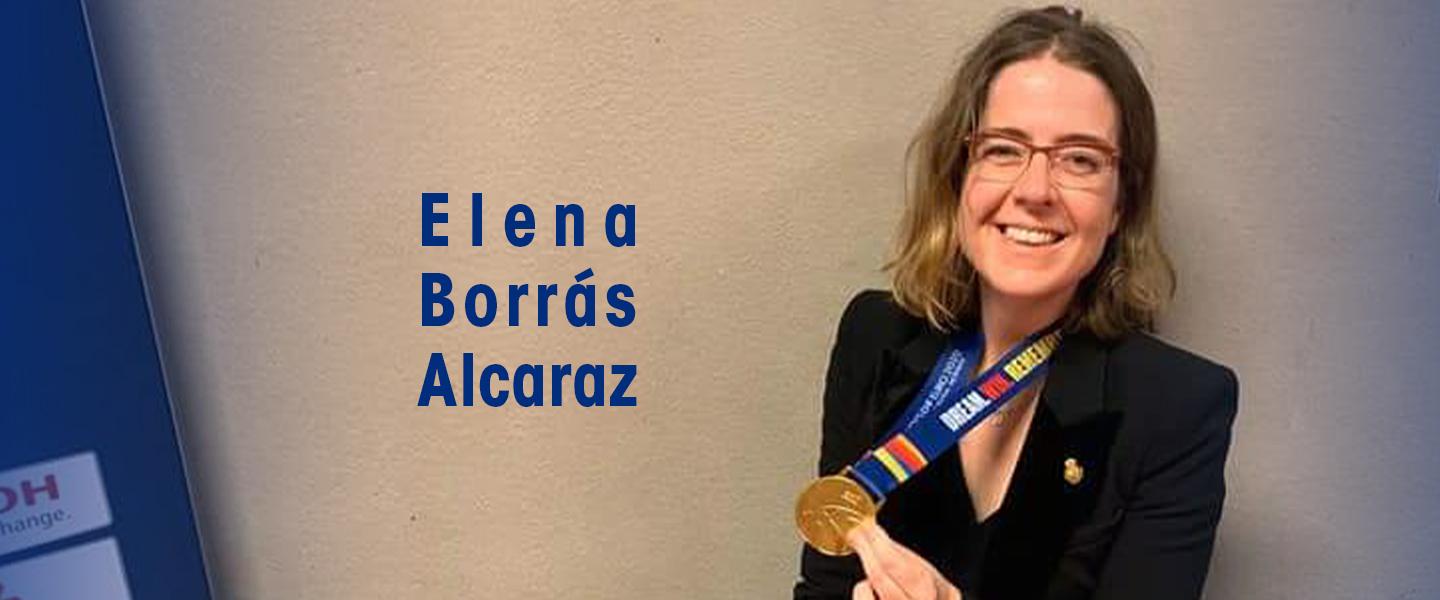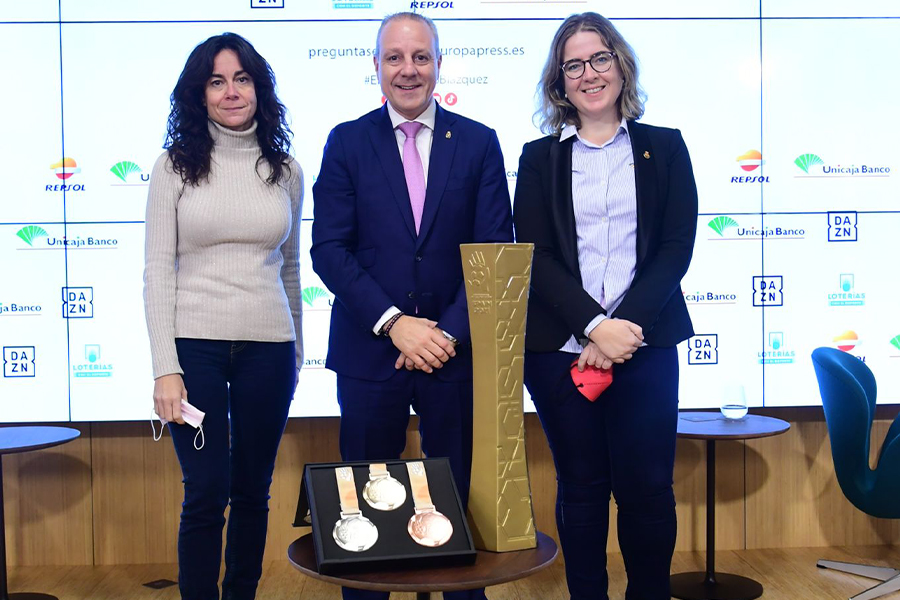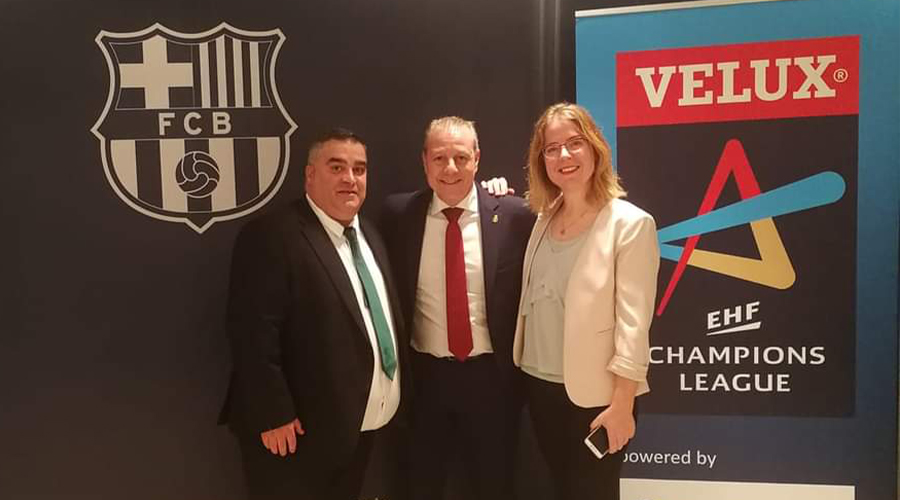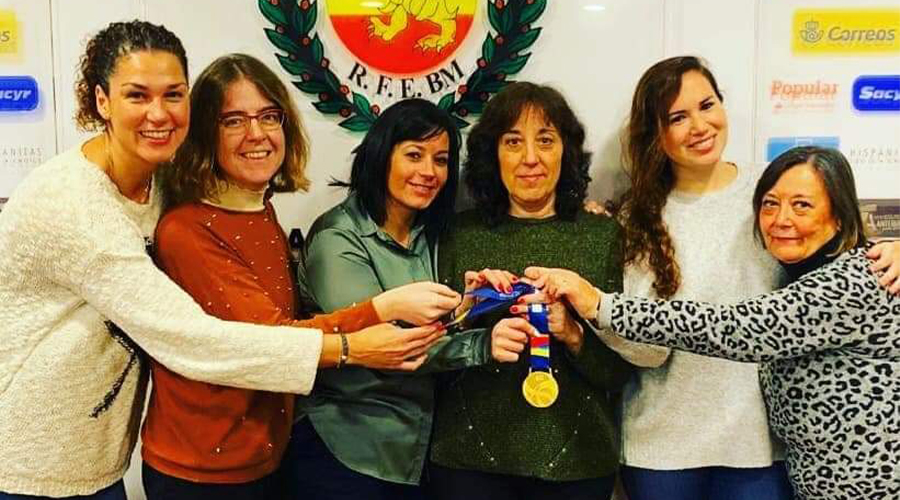Spain’s Elena Borrás: “Don’t limit yourself”
17 Mar. 2022

Throughout the month of March, the IHF celebrates women in various roles in handball in a special series. Part five focuses on Elena Borrás Alcaraz, Chief of Staff for the President of the Royal Spanish Handball Federation (RFEBM) and part of their international department, as we hear from her on how you should always keep an open mind and what it is like to organise IHF World Championships.
Elena Borrás Alcaraz is busy. “Something came up,” or “I have the European Championship qualification matches this week.”
It takes two weeks from initial contact to conducting the interview. But this is exactly why ihf.info want to speak to Borrás: her finger is right on the pulse of Spanish handball. She is involved deeply.
“Everything’s coming our way in the next weeks; we have the Copa del Rey (King’s Cup), Copa de la Reina (Queen’s Cup), European championship qualification matches, international meetings, everything. Now I have a more or less normal week, I think. I hope.”
A Spanish flavour providing a global perspective
This is all said with a smile and a laugh. Evidence of Borrás’ ease and calmness of dealing with highly-technical, challenging events – especially during the time of Covid.
One such event was the recent IHF Women’s World Championship, held across four cities in four venues last December, but since starting with the RFEBM back in 2009, Borrás has helped organise London 2012 and Tokyo 2020 Olympic Qualification Tournaments, the 2013 IHF Men’s World Championship and the 2019 IHF Men’s Junior World Championship. All key, global events.
“In 2012, the Olympic Qualification Tournament hosts were chosen by sporting merit, so we had the chance to organise both the men’s and the women’s ones, in Alicante in April and Guadalajara in May, so in six weeks we had two tournaments,” explained Borrás. “We were also well underway with our planning for the 2013 IHF Men’s World Championship so it was kind of a crazy year to start working full time in handball for me.”
Borrás has fond memories from all of these global events and revealed that they helped open her eyes.
“The best thing about my role during those first tournaments is that I got the chance to see my country and our handball in the eyes of the countries participating,” explained Borrás, who is from the coastal town of Vinaros.
“Every day we work in our own world, in our business, doing the normal things that we do every day, but then you get the chance to welcome these teams from many different backgrounds. From Africa, from Oceania, from everywhere.
“You not only see handball, but the organisation of the tournament and your country, our food, the weather, the hotels, our traditions, our dances through their eyes. You see the surprises, the amazing things that they appreciate and that you take for granted, from the level of your handball or organisational point of view.
“It was really a learning experience for me. It was like I got to travel to the different 24 or 32 countries who were participating. It was really enriching to me.”
Spain 2021 represented the first time the IHF Women’s World Championship had featured 32 teams, an increase of 33% from Spain 2013, but for Borrás, it represented a chance to further her knowledge.
“We got the chance to see more cultures as, with the increase in teams, they are usually from parts of the world where they didn’t have the chance normally (to qualify) or handball is not that big in their country.
“You then have to see their point of view, their way of experiencing these events, their different training methods, traditions, cultural and religious aspects – you get the chance to see that they have another approach and focus.
“More teams means you need more venues, which means more people and more team guides and local coordination, to name a few.
“More teams also means more effort in every kind of way, economically, from a human resources (HR) point of view, but it also means more markets are open to see handball and the event all over the world. For the RFEBM this meant we got the chance to have more partners, give more promotion to our current ones and our sport got to be seen by more eyes across the world.
“It was a challenge to have that many teams to manage – plus we had to implement all the Covid protocols – but it was really thrilling.”

Spain 2021 saw games played in Granollers, Lliria, Castellon and Torrevieja and it was an opportunity for Borrás and the RFEBM to work closely with the cities.
“It has been a chance to integrate the cities into the event because they really got involved,” explains Borrás, whose father Pep played handball. “They got hold of the countries they were hosting and many Ambassadors came to see the matches.
“For example, in one city we had the participation of a team from Africa and ahead of Spain 2021 the schools dedicated time to learn its culture and then went to see the matches. They got engaged with teams, with the championship and really welcomed their teams with the best conditions.
“This was a really clever, intelligent navigational tool they used to not only promote the championship, but to educate the students and I really liked the fact that I think we, as the RFEBM, delivered a message to the cities and venues that this championship was for them as well.”
The road to handball is not a straight line
Borrás never set out to work in handball. A self-confessed sports fan, she grew up watching sport, but went on to study law at university in Barcelona. After completing her studies in the Catalonian city, she was not sure what to do next.
“I discovered the first LLM Master’s of Law programme in Sports Law in Europe and it was going to be held in Madrid, in English,” she explained. “It was 2007 and I was still living in Barcelona so I had to move.
“I did it and then I was hired to coordinate a similar online programme in Spanish run by the company that I had studied the Master’s with. I was remotely co-ordinating the pool of teachers to deliver the course and one of them was Mila Morcillo, who was the Legal Adviser for the RFEBM, and still is. We got to talking and I told her my father once played handball and we got a good relationship.
“A year later I was then looking for a full time job in sports law. This meant that I was travelling the 500km or so from home to Madrid every now and then to attend every seminar, every course and every opportunity that I could to meet people to see if I got the chance to move to Madrid to have a job like that. I then met Mila in person and that was it.”
In December 2008, elections at the RFEBM meant a change of President with former coach Juan de Dios Román making changes to the composition of the disciplinary committees. Morcillo needed staff and Borrás accepted a role to work one morning a week for the next few years (January 2009 – October 2011).
Despite Borrás asserting that she was there to “…just translate regulations, emails and so on,” at the beginning, she made an impression, working closely with numerous staff members on various projects and when Francisco V. Blázquez García was elected as the new RFEBM President in April 2013, her role expanded exponentially.
“He totally changed my position and little by little I began travelling with him and changing and developing my career to how it is today,” explains Borrás.
Her dual role ensures no week is ever the same. In her Chief of Staff of the President role she ensures that whatever the President needs, or if someone needs something from him, it goes through her and his closest team – the Presidential office, which is composed of Borrás alongside Executive Assistant Patricia López.
“He’s a really a hands-on person, he tries to contact everybody himself and everybody in Spanish handball has had his number for years, but we try to change this a little bit and help him attend all requests and demands, otherwise we could lose him,” jokes Borrás about the work ethic of the President, known to everyone in handball as ‘Paco’.
“My goal is to become the vessel through which people get to him. I work with all the departments of the RFEBM so that whenever he gets a project or decision to make, he has all the material already on his table and all the options available and everybody has done their work – he receives the topic up to the decision-making step.”

Borrás still continues in the international department, which oversees “…everything that has to go outside of Spain or that comes from outside Spain,” along with her colleague Alba Rivero.
Diversity within handball
When asked about her thoughts related to gender equality month, Borrás is supportive, but is keen to explain that it is part of a wider viewpoint.
“For me, it’s all about diversity, but in every aspect,” she explains. “Not only handball, but in society in general, it has shown that it's really positive for everybody to have the chance to speak and to hear different points of view of people with different sensibilities and different needs.
“In handball, we have powerful people who happen to be women, this gives visibility and relevance to really powerful, prepared, educated and experienced people in these positions who happen to be women, who are not just in these positions because they are a woman.
“I hope to see many more every day, but for me, it’s the same idea as having clubs, players and federations represented (at the RFEBM) – we need to have these different points of view because everybody’s opinion and everybody’s conversation is interesting to get to a global level of understanding and to get the feelings of all the stakeholders and all the sensibilities involved. This will for sure take us to the next level.”
These thoughts are echoed not only around through words, but by action, with women represented across the RFEBM on various commissions and in different political positions.
“We have women from every experience,” says Borrás. “We have former national team players, former coaches, women's club managers, those involved in politics. There are women who are experienced and who can speak first-hand about their handball experience in many fields.
“One of our vice presidents, Diana Box Alonso, was a former national team player, is on the Sports Council of the City Hall of Torrevieja and is head of the women’s handball players union, amongst other things. She is really someone who is prepared, has the experience, the knowledge, the contacts. She’s a really powerful person.
“We also have six other women on the executive board, who are club managers, the vice president of the Catalan Handball Federation, a former national team player and also a mother of current national team player. We also have the National Team's Manager, and Women’s Players Union representatives, a Chief of Police, and one of the two female presidents of current ASOBAL teams.”
The RFEBM constantly work hard to bring more visibility and more professionality into not only Spanish handball, but in Spanish women’s sporting competition and handball itself, utilising various avenues at their disposal. The RFEBM President even sits on the EHF’s Women’s Handball Board and under his presidency, Blázquez has more than doubled the number of women working at the RFEBM offices.

And they have an exciting 2022 coming up including a number of projects taking place, leading up to their co-hosting of the 2028 EHF Men’s European Championship as well as working closely with the Mediterranean Handball Federation and enjoying partnerships with the Polish, Argentinian, Slovakian and Portuguese handball federations.
“We are looking forward to strengthening the cooperation with all these countries and looking forward to expanding it to other continents,” explains Alcaraz. “If we can learn so much from Portugal, our neighbour and whom we have so much in common with, just imagine what we can learn from a country that has nothing to do with us in terms of culture or tradition or way of managing sports?”
So, as Borrás looks back at her career so far, what advice would the 2022 Elena give to the young Elena, just starting out on her career?
“To the young Elena I would say that she should never give up: nothing is really random,” says Borrás.
“No-one in my family has done what I am doing now. No one in my family was living in Madrid. I wasn’t following anyone’s path. I made my own path. You have to go for it because you find the force, the strength, the time and the effort.
“When you really want something you will never get tired. The hours do not get long. You don’t see the end of your days. You just keep going because you’re so full of motivation with so much energy because you’re pursuing something that you really want.
“What is it that you want to do in your life that would make you want Monday to come? You have to find this and whatever it is and as crazy as it may seem, go for it.
“I wasn’t initially looking forward to this job but sometimes the best things, the best jobs and the best opportunities come when you least expect them, from people that you least expect it.
“Don’t close any doors. To the contrary: never stop meeting people, making contacts, going to seminars because you never know what or who is trying to open a door for you. I was studying a law degree, but this job is not exactly what I was educated for. Don’t limit yourself.”
Photos courtesy of Elena Borrás Alcaraz

